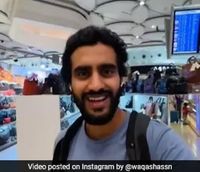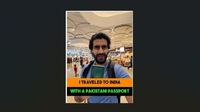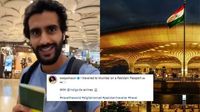Waqas Hassan, a Pakistani entrepreneur, made headlines recently for his remarkable transit experience through India, offering a glimpse into the challenges faced by Pakistani nationals traveling to the country. On March 20, 2025, Hassan boarded an IndiGo flight from Singapore to Saudi Arabia, utilizing a six-hour layover at Mumbai's international airport. His journey, shared in a viral Instagram video, has not only attracted attention but also brought to light the complexities of transiting through India as a Pakistani citizen.
Hassan's adventure began with a simple booking, but it turned into a surprising revelation for many. In his Instagram video, he enthusiastically stated, "This time I’m flying from Singapore to Saudi Arabia. And currently, I’m in Mumbai," as he walked through the bustling airport. Although technically allowed to transit, Pakistani passport holders face strict regulations; they must remain within the airport during layovers and cannot self-check in for flights.
During his six-hour stay at the Mumbai airport, Hassan didn't let the restrictions dampen his spirit. He capitalized on his layover by enjoying the airport's amenities—relaxing in the lounge, shopping for souvenirs, and savouring the local delicacy, vada pav. "It’s a pretty fun feeling," he expressed, appreciating the brief encounter with the vibrant atmosphere of Mumbai.
"When I gave them my passport at the airport, they also looked at me in surprise. They said not many Pakistani people do this, so it was a new experience for them as well," Hassan recounted. This interaction highlighted not only his unique position but also the rarity of such occurrences, as leisure travel between India and Pakistan tends to be infrequent due to historical tensions.
For Pakistani nationals, the process of obtaining permission to travel through India is often arduous. A 100% prior reference process is mandatory, meaning travelers must secure clearance well before their journey—a task that can take up to 90 days. Even when granted a transit visa, they are limited to a stay of 36 hours in the city of entry and must remain within the airport.
Hassan's insight that many, including himself, were unaware of the option to transit through India underscores the lack of readily available information on travel regulations. He recalled, "I have been travelling for 15 years. Nobody told me that we [Pakistanis] can transit through India. So when I booked this ticket, there was a slight bit of risk involved as well." His willingness to explore this lesser-known path has opened up discussions regarding greater cultural exchange and travel ease between the two countries.
The reactions to Hassan's video have been diverse and passionate. Many social media users expressed excitement and surprise at this newfound option, sharing their own experiences and thoughts on potential travel. One user wrote, "Pakistani awaam should be allowed to visit India and vice versa. I love you guys and no one is good or bad; we all are shades of grey. I respect your culture and country and I will request our government to make easy access for citizens of both the countries to visit each other." Meanwhile, others voiced skepticism about the joy of being confined to an airport, questioning what real enjoyment could be found in such circumstances.
Hassan’s journey not only sheds light on the strict travel regulations faced by Pakistani citizens but also demonstrates the human desire for connection beyond borders. His personal experience is a testament to the ongoing dialogue about the need for cultural interchange and the potential for more accessible travel options between India and Pakistan.
Ultimately, Waqas Hassan's unique transit through India offers both a reflection of the current socio-political landscape and a spark of hope for future collaborations and friendliness between the two neighboring nations. As conversations grow around his travels, it paints a picture of possibility in a region often marred by conflict—a reminder that barriers can be breached when individuals take steps to connect with one another.
 Vada Pao">
Vada Pao">





